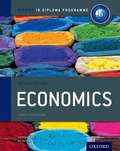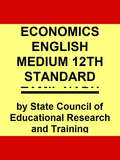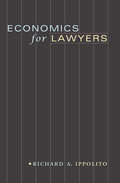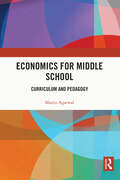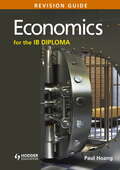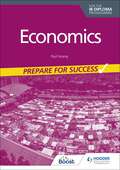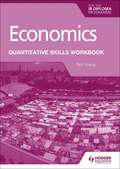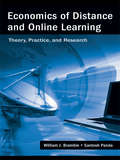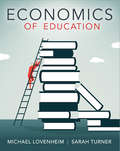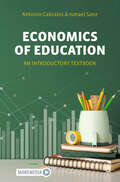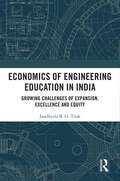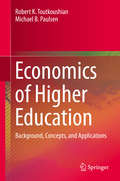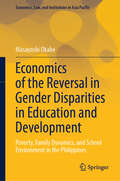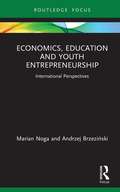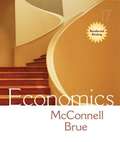- Table View
- List View
Economics
by Jocelyn Blink Ian DortonThe only DP resources developed with the IB. Our bestselling IB Diploma course book for Economics has been revised and updated in line with the 2011 syllabus change.
Economics (Apexit) class 12 - GSTB - Navneet: ધોરણ ૧૨ અર્થશાસ્ત્ર અપેક્ષિત પ્રશ્નસંગ્રહો (માર્ચ, 2020ની બોર્ડ-પરીક્ષા માટે લેટેસ્ટ પેપર-પેટર્ન અનુસાર)
by Navneet Ltd.ધોરણ ૧૨ અર્થશાસ્ત્ર અપેક્ષિત પ્રશ્નસંગ્રહો માં ૨૧ પ્રશ્નસંગ્રહો આપેલ છે અને ૨ આદર્શ પ્રશ્નપત્ર આપેલ છે.
Economics class 10 - Karnataka Board: ಅರ್ಥಶಾಸ್ತ್ರ 10 ನೇ ತರಗತಿ - ಕರ್ನಾಟಕ ಮಂಡಳಿ
by Karnataka Patyapusthaka SanghaText Book for 10th Standard Kannada Medium Economics book, Karnataka State
Economics class 11 - GSTB: ઇકોનોમિક્સ વર્ગ 11 - જીએસટીબી
by Gstbઆ પુસ્તક ધોરણ 11 નું અર્થશાસ્ત્ર વિષય નું પાઠ્યપુસ્તક છે .
Economics class 11 - Tamil Nadu Board - SCERT
by Government Of Tamil NaduTo acquire a fundamental knowledge on the subject of Economics and to understand its nature and scope; and, To understand the meaning of some of the basic concepts of Economics andto observe how they are applied in the various definitions formulated on thescience of Economics.
Economics class 11 - Tamil Nadu Board - SCERT: பொருளியல் தமிழ்நாடு அரசு மேல்நிலை முதலாம் ஆண்டு
by Government Of Tamil NaduTo acquire a fundamental knowledge on the subject of Economics and to understand its nature and scope; and, To understand the meaning of some of the basic concepts of Economics andto observe how they are applied in the various definitions formulated on thescience of Economics.
Economics class 12 - Tamil Nadu Board - SCERT
by ScertTo acquire a fundamental knowledge on the subject of Economics and to understand its nature and scope; and, To understand the meaning of some of the basic concepts of Economics andto observe how
Economics class 12 - Tamil Nadu Board - SCERT: பொருளியல் தமிழ்நாடு அரசு மேல்நிலை இரண்டாம் ஆண்டு
by Accessable E-Book Production Unitஇந்த புத்தகத்தின் வாயிலாக நாட்டின் பொருளாதாரத்தின் நிலையையும், மற்றும் அதனால் ஏற்பட்ட மாற்றங்களை பற்றியும் நாம் படித்தும், ஆசிரியர்கள் மூலமாக தெரிந்கொள்ளலாம்
Economics class 8 - Karnataka Board: ಅರ್ಥಶಾಸ್ತ್ರ 8 ನೇ ತರಗತಿ - ಕರ್ನಾಟಕ ಮಂಡಳಿ
by Karanataka patya pustaka sanghaIts an 8th standard economics text book for kannada medium
Economics class 9 - Karnataka board: ಅರ್ಥಶಾಸ್ತ್ರ 9 ನೇ ತರಗತಿ - ಕರ್ನಾಟಕ ಮಂಡಳಿ
by Karantaka patya pustaka sanghaIts an 9th standard kannada medium Text Book
Economics for Lawyers
by Richard A. IppolitoWhether dealing with contracts, tort actions, or government regulations, lawyers are more likely to be successful if they are conversant in economics. Economics for Lawyers provides the essential tools to understand the economic basis of law. Through rigorous analysis illustrated with simple graphs and a wide range of legal examples, Richard Ippolito focuses on a few key concepts and shows how they play out in numerous applications. There are everyday problems: What is the social cost of legislation enforcing below-market prices, minimum wages, milk regulation, and noncompetitive pricing? Why are matinee movies cheaper than nighttime showings? And then there are broader questions: What is the patent system's role in the market for intellectual property rights? How does one think about externalities like airport noise? Is the free market, a regulated solution, or tort law the best way to deliver the "efficient amount of harm" in the workplace? What is the best approach to the question of economic compensation due to a person falsely imprisoned? Along the way, readers learn what economists mean when they talk about sorting, signaling, reputational assets, lemons markets, moral hazard, and adverse selection. They will learn a new vocabulary and a whole new way of thinking about the world they live in, and will be more productive in their professions.
Economics for Middle School: Curriculum and Pedagogy
by Manju AgarwalThis book discusses the importance of teaching fundamental economic concepts as part of the middle school social science curriculum in India. It examines the status of economics in Indian schools, the issues faced in teaching it at the middle school level, and emphasizes the need for increasing the economic literacy of students. It offers valuable recommendations to curriculum planners and educators to help them bolster economics education in Indian schools. The author presents an extensive curriculum framework with the intention of developing intellectual and social skills in students. The book also features classroom tested lessons, content guidelines, and a comprehensive teaching plan for grades six, seven, and eight. A crucial contribution to the study of school education in India, this book will be of interest to teachers, students, and researchers of education, economics education, and economics. It will also be useful for policy planners, professional economists, administrators, school boards, and research institutions.
Economics for the IB Diploma Revision Guide: (International Baccalaureate Diploma)
by Paul HoangEconomics for the IB Diploma Revision Guide will ensure students can aim for their best grade with the help of accurate and accessible notes, examiner advice, and exam-style questions on each key topic. - Builds revision skills through a range of strategies and detailed examiner advice - Covers all the knowledge with concise, clear explanations of all the syllabus requirements and topics - Demonstrates what is required to get the best grades with tips, sample questions and model answers Answers are free online at www.hodderplus.com
Economics for the IB Diploma Revision Guide: (International Baccalaureate Diploma)
by Paul HoangEnsure students can aim for their best grade with the help of accurate and accessible notes, expert advice, and exam-style questions on each key topic.- Builds revision skills through a range of strategies and detailed expert advice- Covers all the knowledge with concise, clear explanations of all the syllabus requirements and topics- Demonstrates what is required to get the best grades with tips, sample questions and model answersAnswers are free online at www.hoddereducation.com/IBextras
Economics for the IB Diploma: Prepare for Success
by Paul HoangSupport your students to achieve their best grade with the ultimate course companion; providing clear and concise explanations of all new framework requirements and topics, with exam practice questions to strengthen and develop learning.- Build confidence and reinforce skills with guidance on how to include key concept, content and context connections into exam answers.- Practise and revise effectively from a range of strategies and a variety of high-achieving example answers.- Achieve the best grades through advice given from a highly experienced author on how to approach and explore a topic through inquiry, including additional top tips and common mistakes.- Focus revision by using key terms with definitions listed for each of the nine key concepts of the new course.- Answers are available to download for free: www.hoddereducation.co.uk/ib-extras
Economics for the IB Diploma: Quantitative Skills Workbook
by Paul HoangReinforce and improve your students' quantitative skills with this write-in workbook, which includes exam-style practice questions. · Prepare for the new assessment model with exam-style questions that are broken down to help students understand the question as a whole and the way they will need to tackle it.· Questions are presented in the chronological order of the syllabus, to aid knowledge and understanding of the new course (first exams 2022).· Provides lots of opportunities to practice quantitative skills, techniques and methods with exam-style questions.· Detailed mark schemes are provided to support students' assessment success, from a highly experienced author, IB workshop leader and teacher.· Answers available to download for free: www.hoddereducation.co.uk/ib-extras
Economics of Distance and Online Learning: Theory, Practice and Research
by William J. Bramble Santosh PandaThis book provides a comprehensive overview of the organizational models of distance and online learning from an international perspective and from the point of view of economic planning, costing and management decision-making. The book points to directions for the further research and development in this area, and will promote further understandin
Economics of Education
by Sarah Turner Michael LovenheimWhile there are many great research articles, good books, and provocative policy analyses related to the economics of education, these materials are often written to influence the policy process and not necessarily for students with limited knowledge of the underlying policies and the economic framework. This textbook is intended to serve as a foundation for a broad-based course on the economics of education. Its goal is to provide an overview of economics of education research: to lay out the evidence as clearly as possible, note agreements, disagreements, and unresolved points in literature, and to help students develop the tools necessary to draw their own conclusions.
Economics of Education: An Introductory Textbook
by Antonio Cabrales Ismael SanzThis textbook provides students with a comprehensive overview of the economics of education, introducing and consolidating core topics, current research and practical methodologies in the field. The textbook focuses throughout on the impact of education economics on policy making, helping students understand the real-world impact of economic theory on public policy. With a wealth of learning features including case studies, worked examples, exercises and further reading lists, it provides a thorough picture of the economics of education systems globally. Chapters cover a range of topics, from class size to the impact of family and peers on education, as well as exploring unique educational stages such as pre-school and vocational training, access to university, and cross-cutting issues such as educational inequalities and the role of gender in education. Going beyond simply an economics approach by also introducing perspectives from psychology and sociology, the textbook offers students a holistic grasp of the themes and issues that resonate with educational communities. At the same time, it equips students to carry out accurate methodological research, encompassing randomized controlled trials, empirical studies and accessible databases. This book will be essential reading for students in economics and the social sciences more broadly, as well as policy-makers and educators.
Economics of Engineering Education in India: Growing Challenges of Access, Excellence and Equity
by Jandhyala B. TilakThis volume focuses on the expansion of engineering education in the private sector in India and discusses the effects and challenges of this expansion on its economic growth and development. Analysing several dimensions relating to the growth of engineering education, this book: — Scrutinises the imbalances in the growth between different branches of engineering education, changing trends and patterns of quality of education as impacted by changing trends and patterns, gender inequality, caste, region, and labour market conditions that influence the demand for engineering education. — Investigates the socioeconomic characteristics of the students going to private colleges/universities, financing by the government vis-a-vis students’ households, the unsteady growth in public financing of engineering education, and educational loans as a method of financing. — Examines the reasons behind the increasing demand of engineering education, and the factors that have contributed to the rise of electronics engineering, computer science engineering and information-technology-related areas of engineering as against some conventionally popular disciplines of engineering. This volume will be of interest to students, teachers and researchers of education, higher education, engineering education, economics of education, and sociology of education. It will also be useful for policymakers in higher education, engineering/technical education and BRIC countries, administrators, and those interested in the study and growth of engineering education.
Economics of Higher Education
by Robert K. Toutkoushian Michael B PaulsenThis book examines the many ways in which economic concepts, theories and models can be used to examine issues in higher education. The topics explored in the book include how students make college-going decisions, the payoffs to students and society from going to college, markets for higher education services, demand and supply in markets for higher education, why and how state and federal governments intervene in higher education markets, college and university revenues and expenditures, how institutions use net-pricing strategies and non-price product-differentiation strategies to pursue their goals and to compete in higher education markets, as well as issues related to faculty labor markets. The book is written for both economists and non-economists who study higher education issues and provides readers with background information and thorough explanations and illustrations of key economic concepts. In addition to reviewing the contributions economists have made to the study of higher education, it also examines recent research in each of the major topical areas. The book is policy-focused and each chapter analyses how contemporary higher education policies affect the behaviour of students, faculty and/or institutions of higher education. "Toutkoushian and Paulsen attempted a daunting task: to write a book on the economics of higher education for non-economists that is also useful to economists. A book that could be used for reference and as a textbook for higher education classes in economics, finance, and policy. They accomplish this tough balancing act with stunning success in a large volume that will serve as the go-to place for anyone interested in the history and current thinking on the economics of higher education. " William E. Becker, Jr. , Professor Emeritus of Economics, Indiana University
Economics of the Reversal in Gender Disparities in Education and Development: Poverty, Family Dynamics, and School Environment in the Philippines (Economics, Law, and Institutions in Asia Pacific)
by Masayoshi OkabeThis book examines the background and consequences of the reversal in gender disparities in education through the case of the Philippines. While global education and development discourse has long emphasized girls&’ disadvantage, a reversal—where boys are falling behind in education—has also recently emerged in a number of countries in developing contexts. This book critically investigates this issue in the Philippines, hailed as the top runner of gender equality in Asia and the Pacific, where boys—especially those from poorer households and in rural areas—are increasingly falling behind. Drawing on data from three provinces across the archipelago&’s main regions—Luzon, Visayas, and Mindanao, the book empirically traces the background and consequences of the reversal in family dynamics and school environments amid poverty and uneven development. It reveals that boys&’ educational disengagement cannot be understood independently of broader socioeconomic structures. While girls may outperform boys in education, labor market and familial systems often continue to disadvantage women, recursively shaping boys&’ educational disengagement. Through the lens of intergroup heterogeneity, this book offers an in-depth examination of the nature of the reversal. The economics of reversal is thus used not merely to describe, but to rigorously interrogate surface-level shifts that may obscure deeper, enduring asymmetries. The book adopts an interdisciplinary approach combining development economics, education, and area studies, aiming to bridge econometric rigor and field-based contextual sensitivity. It is intended for scholars, educators, policymakers, and students interested in evolving patterns of education and development. This volume presents an expanded and refined development of the author&’s earlier research, which was awarded the Main Prize at the 19th Asia Pacific Research Prize (Iue Prize), conferred by the Asia Pacific Forum, Awaji Conference Japan.
Economics, Education and Youth Entrepreneurship: International Perspectives (Routledge Focus on Economics and Finance)
by Marian Noga Andrzej BrzezińskiThe aim of this book is to justify the importance of economic knowledge for every human being in a country with an economic system based on the market mechanism, and to explain and debunk the myths and stereotypes related to economic education and its effectiveness, particularly among young people. The book offers a comparative analysis of the economic education of young people in Poland and throughout the world. It examines the historical emergence of economies and economic thinking and decision-making as well as the different philosophies and educational systems in the EU and the USA. It thoroughly investigates the economic knowledge of Polish youth via an annual study, which the authors have conducted since 2012. The book outlines both the formal and informal methods of economic education, from education programs in general secondary schools and economic technical schools, as well as in vocational schools, and also examines school Business Incubators. It concludes with a summary, reviewing the implementation of research goals and issues and outlining directions for future research. The authors break down complex topics and provide readers of this book with a base knowledge of economics at the micro and macro levels. The book will serve as a useful and practical guide for students and researchers, as well as policymakers concerned with rethinking the education system. Additionally, it will be a helpful resource for those wanting to acquire the knowledge needed to conduct a business, as the authors maintain that entrepreneurship can be learned.
Economics: Michigan Edition Grades 9-12
by Arthur O'Sullivan Steven M. SheffrinThe System includes: Higher-level content that gives support to access complex text, acquire core content knowledge, and tackle rigorous questions. Inquiry-focused Projects, Civic Discussions, and Document Analysis activities that develop content and skills mastery in preparation for real-world challenges; Digital content on Pearson Realize that is dynamic, flexible, and uses the power of technology to bring social studies to life. The program uses essential questions and stories to increase long-term understanding and retention of learning.
Economics: Principles, Problems, and Policies / Edition 17
by Stanley L. Brue Campbell McconnellMcConnell and Brue's Economics: Principles, Problems, and Policies is the leading Principles of Economics textbook because it is innovative and teaches students in a clear, unbiased way. The 17th Edition builds upon the tradition of leadership by sticking to 3 main goals: help the beginning student master the principles essential for understanding the economizing problem, specific economic issues, and the policy alternatives; help the student understand and apply the economic perspective and reason accurately and objectively about economic matters; and promote a lasting student interest in economics and the economy.
